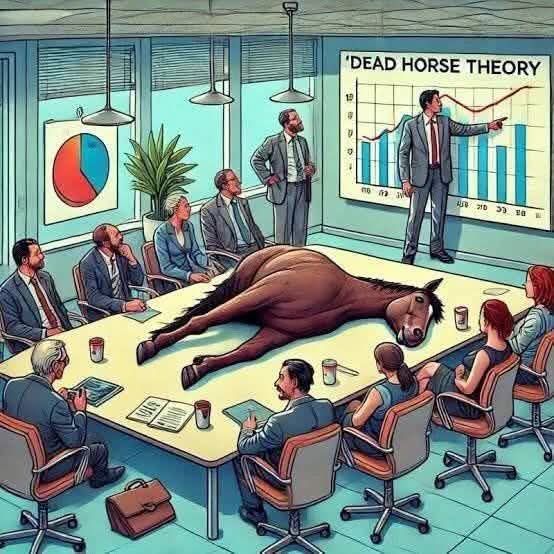The Dead Horse Theory: A Lesson in Recognizing Futility
The Dead Horse Theory: A Lesson in Recognizing Futility
In a fast-changing world, progress often hinges on adaptability and timely decision-making. Yet, many individuals, organizations, and even governments fall prey to a peculiar human tendency: persistently investing effort, time, and resources into approaches that no longer work. This phenomenon is aptly captured by the metaphorical Dead Horse Theory.
The origins of this concept are unclear, but the wisdom it conveys is universal. The theory humorously states, “When you discover you are riding a dead horse, the best strategy is to dismount.” However, instead of accepting the reality, people often take counterproductive actions like whipping the horse harder, changing riders, or forming committees to study the horse’s behavior.
What is the Dead Horse Theory?
At its core, the Dead Horse Theory is about recognizing when an idea, strategy, or method has outlived its usefulness. It warns against the common tendency to cling to familiar but ineffective practices simply because they are comfortable or because significant resources have already been invested.
This principle finds relevance in various aspects of life:
- Business: Companies often pour resources into failing products, reluctant to abandon them despite clear market signals.
- Education: Traditional teaching methods persist in some classrooms even when modern, evidence-based approaches prove more effective.
- Government Policies: Policies that have failed to deliver intended outcomes are sometimes maintained due to political pressure or fear of public backlash.
Why Do We Keep Riding Dead Horses?
Psychologists attribute this behavior to cognitive biases like the sunk cost fallacy, where people irrationally hold on to failing endeavors because of the time, money, or effort already invested. There is also the fear of change, as abandoning a failed strategy often requires starting anew, which can feel daunting.
The Consequences of Ignoring Reality
Persisting with “dead horses” can lead to wasted resources, stalled progress, and frustration. For example, organizations that refuse to evolve risk being outpaced by competitors. On a personal level, individuals may miss opportunities for growth by refusing to let go of unproductive habits or relationships.
Applying the Dead Horse Theory
To avoid falling into this trap, individuals and organizations should:
- Assess Outcomes Honestly: Regularly evaluate the effectiveness of strategies and practices.
- Embrace Change: Recognize that change is not failure but an opportunity for improvement.
- Prioritize Efficiency: Redirect energy and resources toward approaches with higher chances of success.
- Encourage Innovation: Foster a culture where experimentation and adaptation are valued.
A Broader Perspective
The Dead Horse Theory also offers a deeper philosophical lesson: resilience and wisdom lie in knowing when to persevere and when to let go. Whether it’s a career path, a relationship, or a business strategy, acknowledging when something is no longer working can pave the way for new beginnings and meaningful progress.
In the words of Winston Churchill, “To each, there comes a time when he or she must decide to step forward into growth or step back into safety.” The Dead Horse Theory reminds us that safety in clinging to the past can be an illusion—and that dismounting a dead horse is not defeat, but the first step toward finding a new one.
Let us take this lesson to heart and ensure we’re not riding dead horses in our personal, professional, or societal journeys. Recognizing when to dismount may just be the key to unlocking a brighter future.











Leave a Reply